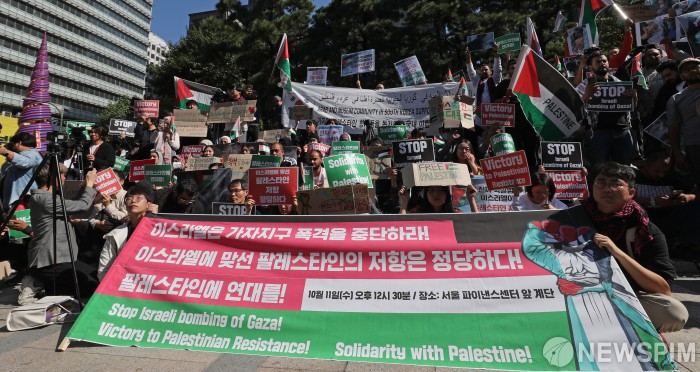(Machine translation + slight editing)
The first rally in support of Palestine is held in Korea... The debate over the 'Israeli-Palestinian War' ignites
October 11, 2023
Since the outbreak of the war between Israel and Palestine (Israeli-Palestinian War), rallies in support of both sides have been held all over the world. Even in Korea, demonstrations in support of Palestine are being held led by civic groups, and related debates are heating up.
Workers' Solidarity and Korea Islam (Kore de Islam) held an emergency rally and march in solidarity with Palestine near Gwanghwamun, Jung-gu, Seoul around 12:30 pm on the 11th.
A total of 200 participants from Egypt, Pakistan, and Uzbekistan, including Koreans and Palestinians, participated in the rally. They held posters such as 'Israel must stop bombing the Gaza Strip' and 'We support the Palestinian resistance' and continuously shouted slogans such as 'Free Palestine'.

Palestinians and members of social civic groups are holding a rally in support of Palestine in relation to the Israel-Hamas war in front of the Seoul Finance Center in Jung-gu, Seoul on the afternoon of the 11th. 2023.10.11
The organizers claimed, “Ethnic cleansing and discriminatory oppression by the State of Israel against Palestinians have continued for decades since the founding of the State of Israel,” and “Israel is massacring innocent people.”
At the ensuing rally, Korean Islamic officials, including Palestinians from the Gaza Strip, gave speeches. In the speech, Mr. Amer, a Palestinian, was interviewed over the phone by an acquaintance in the Gaza Strip and said, "Food has been cut off, so there is a huge shortage, and even the means to provide treatment, such as water, electricity, and medicine, are now extremely lacking," he appealed.
The interview was interrupted due to poor connectivity due to the air raid.
Akela, an Egyptian who participated in the rally, unfolded a piece of paper with pictures of Palestinian children listed like a checkerboard in both hands and said, "It seems like the only language Israel uses is terror and oppression. Are the children in these pictures even the youngest terrorists?" raising their voice.
When the speech ended, these groups held a march around the Israeli Embassy from the steps of the Seoul Finance Center, where the rally took place, to Cheonggyecheon Buk-ro.
Initially, they planned to approach the Israeli embassy and deliver a letter of protest, but due to opposition from the police, they had to return to Musan and stop at reciting the contents of the letter near Cheonggyecheon-ro.
Those who participated in the rally appealed for recognition of the Palestinian people, but also appeared to support the airstrikes carried out by the Palestinian armed political faction Hamas against Israeli residents on the 7th.
Karim Hussein (31), an Egyptian who participated in the rally with his family that day, said, "As Muslims and human beings, we participated in the rally regardless of nationality." He added, "This Hamas airstrike is a 'reaction' to the long history that Palestine has experienced so far," he said.
Jeong Dong-seok (61), a member of the Workers' Solidarity Party, also argued that the cause of the war was, "I think the problem is that Israel has been expelling and massacring the native Palestinians for about 70 years."
The group plans to continue supporting Palestine by holding an additional rally in Incheon on the 13th.
Meanwhile, as the war between Palestine and Israel unfolds, rallies in support of Palestine and Israel are being held all over the world.
According to Reuters, on the 9th (local time), citizens in solidarity with Israel held a march in Buenos Aires, Argentina.
Additionally, on the 10th (local time), a rally supporting Israel and Palestine was simultaneously held near the Israeli consulate in New York.
At the United Nations headquarters in New York, USA, thousands of pro-Israel protesters gathered to condemn the surprise attack by Hamas, while in Chicago, Illinois, on the 8th (local time), Palestinian Americans, mainly, showed solidarity with Palestinians in the Gaza Strip. Street protests were also held.
In addition, 4,000 citizens demonstrated in support of Palestine in Amman, the capital of Jordan, and movements in support of Palestine are seen in the Arab world, from Ramallah in the West Bank to Beirut in Lebanon, Damascus in Syria, and Cairo in Egypt.
However, some Western countries are wary of the spread of anti-Semitism and attempts at terrorism.
Three protesters were arrested at a demonstration in support of Palestine held in front of the Israeli Embassy in London on the 9th (local time). British Home Secretary Suela Braverman called for a strong response, saying, "Waving the Palestinian flag may not be lawful if the intention is to glorify terrorism."
In Marseille, France, about 200 Palestinian supporters protested despite a police ban, and some protestors were fined.
After a rally in support of Palestine was held in front of the Sydney Opera House on the 9th (local time) and an Israeli flag was burned, Australian police warned citizens not to attend the pro-Palestinian rally planned in Sydney this weekend, saying it had not been approved.
Video from rally: https://yewtu.be/watch?v=XKeAmBwB23Q
Article about it by Workers' Solidarity (in Korean): https://wspaper.org/article/30047 (includes many photos)